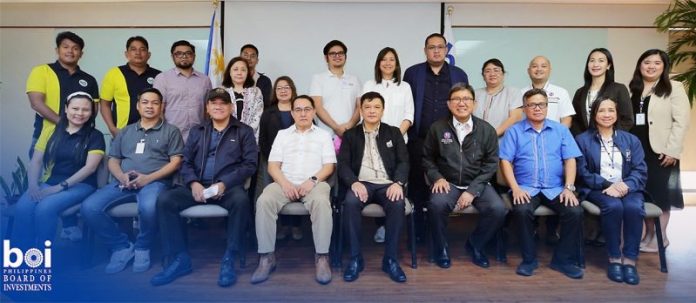
-
An inter-agency gathering led by the Board of Investments agreed to push for revised Anti-Overloading law implementing rules and regulations
-
The revision will take into consideration new types of trucks and an updated computation of gross vehicle weight to include truck dimensions
-
This is to help address concerns on overloaded trucks by NLEX Corp., which holds the concession for the North Luzon Expressway, and the local government units of Bulacan and Pampanga
-
Also proposed was the installation of additional weighbridge stations and portable weighing machines at strategic locations along national roads
An inter-agency gathering led by the Board of Investments (BOI) agreed to push for revised implementing rules and regulations (IRR) for the anti-overloading law that will take into consideration new types of trucks and an updated computation of gross vehicle weight (GVW) to include truck dimensions.
The revision will help address concerns on overloaded trucks of both NLEX Corp., which holds the concession for North Luzon Expressway (NLEX), and the local government units (LGU) of Bulacan and Pampanga, BOI said in a statement.
It said the push for the IRR revision is timely as the Department of Public Works and Highways (DPWH), one of the agencies implementing the Anti-Overloading law, has already formed a special committee for such a task. The law is contained in Republic Act 8794, also otherwise known as An Act Imposing a Motor Vehicle User’s Charge on Owners of all Types of Motor Vehicles and for Other Purposes.
Present during the August 16 meeting were representatives of NLEX Corp., Bulacan and Pampanga LGUs, DPWH, Department of Trade and Industry, Bureau of Customs, Land Transportation Office, and Department of Interior and Local Government.
According to an NLEX Corp presentation, heavy trucks carrying sand traversing the north and south bounds of NLEX usually exceed the allowed axle load limit and GVW as prescribed under RA 8794.
These types of trucks are not included in the matrix of truck classifications issued by DPWH.
Since August 2022, NLEX Corp. has been implementing a 33-ton (12-wheeler and up) weight restriction on the southbound portion of the Candaba Viaduct along NLEX until a new viaduct is completed.
RELATED READ: Vehicles 33 tons and up barred from southbound Candaba Viaduct
Representatives from the Bulacan and Pampanga LGUs raised concerns of persistent overloading damaging roads. This, they said, is costly for LGUs which may have to maintain and rehabilitate public roads. It will also negatively impact the investment potential of the said provinces with investors placing emphasis on good infrastructure, including roads, when deciding on the location of their projects.
During the meeting the BOI said agency representatives approved the suggestion of enhanced inter-agency coordination among government agencies involved in the implementation of the Anti-Overloading Act, and agreed to intensify road safety and weight enforcement campaigns across the country.
Also proposed were additional weighbridge stations and portable weighing machines at strategic locations along national roads for the implementation of the anti-overloading law.
BOI’s Investments Assistance Service suggested this could be undertaken under the LGU-public private partnership scheme. This will be subject to the conduct of a feasibility study, data collection, and an origin and destination survey of DPWH and the LGUs, BOI said quoting DPWH.
It was also agreed that the policy on penalties imposed on overloading be revisited.
BOI said attendees to the gathering will set another meeting to involve other agencies and discuss proposed amendments to the IRR and guidelines on importation of heavy vehicles.
Long-time clamor
Truckers for years have asked DPWH to amend the revised IRR of RA 8794, issued in 2013, to increase the maximum allowable gross vehicle weight (MAGVW) of codes 12-2 and 12-3, two truck types most commonly used for carrying cargoes in the Philippines.
The Confederation of Truckers Association of the Philippines, Inc. (CTAP), in particular, has been requesting the DPWH to permanently suspend enforcement of the MAGVW for these truck codes.
RELATED READ: CTAP suggests ways to make anti-overloading law viable
CTAP earlier reiterated that even if truckers were given an indefinite period to comply with the prescribed MAGVW under the law’s revised IRR, “there would not be any transport equipment anywhere in the world that will satisfy the gross vehicle weight of 41,500 kilograms for 12-2 and 42,000 kg for 12-3.”
In a position paper submitted to DPWH in 2017, CTAP explained that the average weight of containers arriving in the Philippines is around 30,000 kilograms to 36,000 kg, which means that if the minimum weight is added to the tare weight of the tractor head and trailer, which averages 15,000 kg, the total weight would already be 43,500 kg, an outright violation of the law.
The confederation noted that to comply with the MAGVW, “we would need a truck and trailer with a tare weight of around 10,000 kg to 11,500 kg, which would be impossible since the average tare weight of such is 15,000 kg for code 12-2 and 16,000 kg for code 12-3.”
Instead of enforcing the MAGVW, CTAP is proposing that DPWH use the requirement of 13.5 tons per axle as the sole basis for the weight limit of trucks, “the norm among compliant truckers.”
CTAP noted that the 13.5 tons per axle basis “will not cripple the economy” unlike the MAGVW “that will prevent most truckers [from pulling] out containers from the ports because they will be automatically cited for overloading.”
There is also a proposal for the mandatory weighing of cargoes inside port premises, and honouring such results “in order that overloaded container cargo that exceeds the maximum weight shall not be permitted to exit the port premises.”
DPWH since 2013 until June 2021 has enforced a moratorium on the implementation of the IRR on trucks coded 12-2 and 12-3 on repeated requests from truckers. – Roumina Pablo
RELATED READ:
NLEX installs more weighbridges to stem overloading
Anti-overloading law IRR update eyed to allow higher vehicle weight limits




